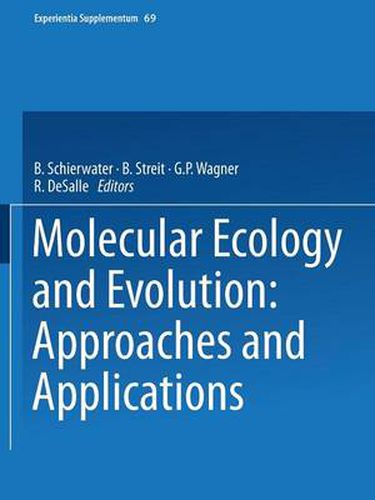Readings Newsletter
Become a Readings Member to make your shopping experience even easier.
Sign in or sign up for free!
You’re not far away from qualifying for FREE standard shipping within Australia
You’ve qualified for FREE standard shipping within Australia
The cart is loading…






This title is printed to order. This book may have been self-published. If so, we cannot guarantee the quality of the content. In the main most books will have gone through the editing process however some may not. We therefore suggest that you be aware of this before ordering this book. If in doubt check either the author or publisher’s details as we are unable to accept any returns unless they are faulty. Please contact us if you have any questions.
In the last 25 years, we have witnessed a revolution in the way that ecologists and evolutionary biologists approach their disciplines. This revolution has been fueled by the ability to dissect the genetic and molecular basis of variation that is partly the currency of these disci- plines. Using modern molecular techniques, we have begun to restruc- ture the spectrum of questions that can be addressed in studying the mechanisms and consequences of the ecology and evolution of living organisms. The molecular revolution has co me in waves, so to speak, with three particularly important developments. The first concerns the establish- ment and widespread use of pro tein analysis. Microcomplement fixation and isozyme e1ectrophoresis were the techniques around which much of the genetic work in ecology and evolution were once based. The next wave started with the development of recombinant DNA technology and centered around the use of restriction fragment length polymor- phisms (RFLPs) and sequencing of DNAs cloned in bacteria. This technology was the first to actually examine and accumulate genetic information at the nucleotide level. The most recent wave of technology that we are currently experiencing is based on our ability to amplify DNA sequences enzymatically via the Polymerase Chain Reaction (PCR). Several techniques re1ated to PCR have been developed and used extensively in ecological and evolutionary studies.
$9.00 standard shipping within Australia
FREE standard shipping within Australia for orders over $100.00
Express & International shipping calculated at checkout
This title is printed to order. This book may have been self-published. If so, we cannot guarantee the quality of the content. In the main most books will have gone through the editing process however some may not. We therefore suggest that you be aware of this before ordering this book. If in doubt check either the author or publisher’s details as we are unable to accept any returns unless they are faulty. Please contact us if you have any questions.
In the last 25 years, we have witnessed a revolution in the way that ecologists and evolutionary biologists approach their disciplines. This revolution has been fueled by the ability to dissect the genetic and molecular basis of variation that is partly the currency of these disci- plines. Using modern molecular techniques, we have begun to restruc- ture the spectrum of questions that can be addressed in studying the mechanisms and consequences of the ecology and evolution of living organisms. The molecular revolution has co me in waves, so to speak, with three particularly important developments. The first concerns the establish- ment and widespread use of pro tein analysis. Microcomplement fixation and isozyme e1ectrophoresis were the techniques around which much of the genetic work in ecology and evolution were once based. The next wave started with the development of recombinant DNA technology and centered around the use of restriction fragment length polymor- phisms (RFLPs) and sequencing of DNAs cloned in bacteria. This technology was the first to actually examine and accumulate genetic information at the nucleotide level. The most recent wave of technology that we are currently experiencing is based on our ability to amplify DNA sequences enzymatically via the Polymerase Chain Reaction (PCR). Several techniques re1ated to PCR have been developed and used extensively in ecological and evolutionary studies.